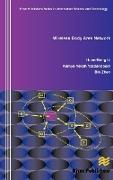- Start
- Wireless Body Area Network
Wireless Body Area Network
Angebote / Angebote:
Wireless body area network (WBAN) is a small scaled network that operates inside, on, or in the peripheral proximity of a body. The strong demands from both medical and healthcare society and consumer electronics industry have been accelerating the development of WBAN. WBAN is expected to be one of the main technologies of providing extremely high convenience and high efficiency in assisting healthcare or medical services. From the consumer electronics point of view, WBAN is also of great interest in providing body centric electronics for leisure, entertainment, game control, etc.
Recent technological advances in low-power microelectronics, miniaturization, and wireless networking enable the design and proliferation of WBAN. However, engineers and designers of WBAN may face a number of challenging tasks such as regulatory circumstance, channel model, low power consumption, thermal effect, antenna and body loss, high-efficiency radios, reasonable data rate, high reliability, and efficient medium access. This book addresses various aspects of WBAN including:
. Introduction
. Regulations
. Antenna, Body Tissues and Radio Propagation
. Physical Layer Technologies
. Medium Access Control
. Standardization
The objective of the book is to provide sound understanding to the basic concepts, characteristics, and technologies of the new fast growing WBAN system. Frequency regulations on candidate frequency bands, such as ultra wideband (UWB), industrial, scientific, and medical (ISM), medical implant communication service (MICS), and wireless medical telemetry system (WMTS), in different countries and regions are investigated and summarized. Antenna, propagation, and
channel modeling related to WBAN are described. Effects of radio frequency on tissues and organs and effects of human tissues on RF propagations are addressed. Physical (PHY) layer technologies including both narrow band and UWB are illustrated. Medium access control (MAC) technologies for WBAN are discussed and a unified MAC design which is independent of underlying PHY technologies is given. Standardization with IEEE802.15.6, IEEE 11073, and ETSI eHealth Project
are briefly reviewed.
This book is a useful tool for university students, communication system engineers, as well as communication system researchers who study or design WBAN
Folgt in ca. 15 Arbeitstagen




